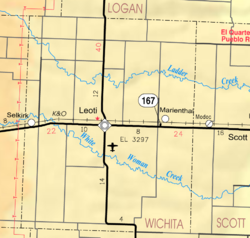Farmer City, Kansas | |
|---|---|
 | |
| Coordinates: 38°17′8″N101°11′35″W / 38.28556°N 101.19306°W | |
| Country | United States |
| State | Kansas |
| County | Wichita |
| Population | |
• Total | 0 |
| Time zone | UTC-6 (CST) |
| • Summer (DST) | UTC-5 (CDT) |
| Area code | 620 |
Farmer City is a ghost town in Wichita County, Kansas, United States.


